新课标九年级英语复习(单元)p328
- 格式:ppt
- 大小:1.13 MB
- 文档页数:328
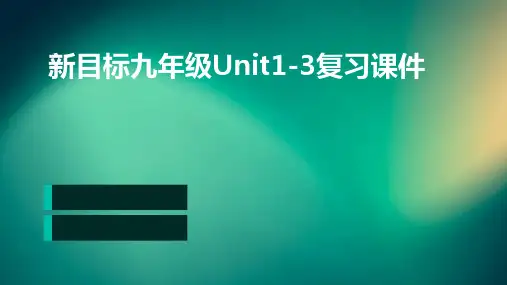
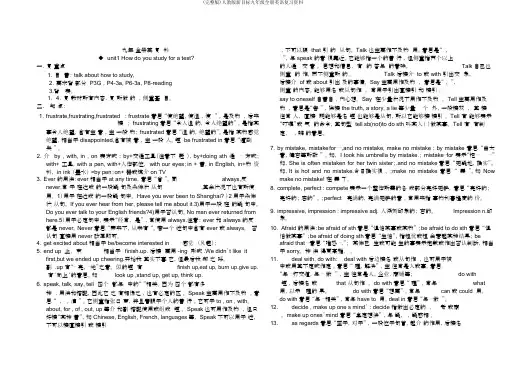
九年全册英复料◆unit1 How do you study for a test?一.复重点1.目言: talk about how to study,2.要求背部分 P3G ,P4-3a, P6-3a, P8-reading3.背表。
1. 4.复教材所有内容,复所做的,侧重基目。
二.知点:1.frustrate,frustrating,frustrated : frustrate 意思“使绝望,使沮,使” ,是及物,后来接; frustrating 意思“令人沮的,令人绝望的”。
是指某事令人绝望,含有主意,主一般物; frustrated 意思“沮的,绝望的”。
是指某物感觉绝望,相当于 disappointed,含有被意,主一般人。
短 be frustrated in 意思“遭到失”。
2.介 by , with, in , on 表方式 : by+交通工具(注意不冠),by+doing sth 通⋯方式;with+ 工具,with a pen, with+人体部位, with our eyes;in +言,in English, in+物资料, in ink (墨水) =by pen;on+器或媒介 on TV3.Ever 的用法:ever 相当于 at any time,意思“曾”。
同always,反never.常于在达成的一般疑句及条件状从句,其余状况下也有所使用。
1)用于在达成的一般疑句中。
Have you ever been to Shanghai? )2用于条件状从句。
If you ever hear from her, please tell me about it.3)用于一般在的疑句中。
Do you ever talk to your English friends?4)用于否认句。
No man ever returned from here.5)用于必定句中,表示“经常,是” ,常使用 always.注意: ever 和 always 的反都是 never。

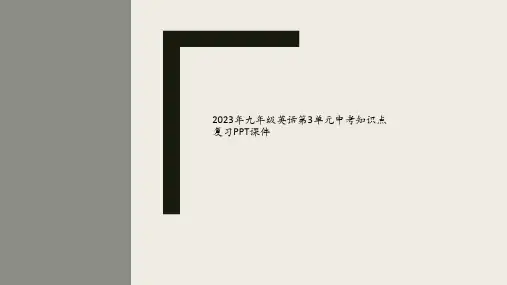
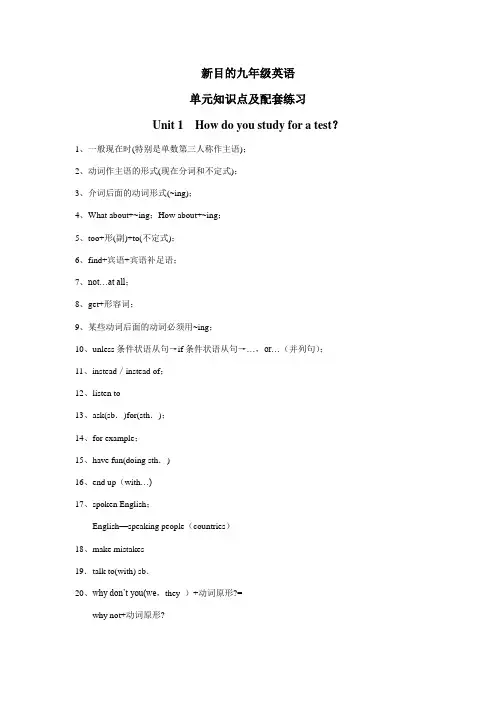
新目的九年级英语单元知识点及配套练习Unit 1 How do you study for a test?1、一般现在时(特别是单数第三人称作主语);2、动词作主语的形式(现在分词和不定式);3、介词后面的动词形式(~ing);4、What about+~ing;How about+~ing;5、too+形(副)+to(不定式);6、find+宾语+宾语补足语;7、not…at all;8、get+形容词;9、某些动词后面的动词必须用~ing;10、unless条件状语从句→if条件状语从句→…,or…(并列句);11、instead/instead of;12、listen to13、ask(sb.)for(sth.);14、for example;15、have fun(doing sth.)16、end up(with…)17、spoken English;English—speaking people(countries)18、make mistakes19.talk to(with) sb.20、why don’t you(we,they )+动词原形?=why not+动词原形?21、laugh at22、first of all23、to begin with.24、later on25、be afraid of sth.(doing)be afraid to do sth.be afraid that从句26、in class/out of class /after class27、take notes28、get an“A”in English29、(sb.)be impressed by(wi th)…30、have trouble doing sth.(回见15)31、look up32、make up a conversation.33、around the world.34、deal with35、stay(keep)+形容词36、go by37、decide(not)to do sth.38、主语+last(延续) for long39、regard sb.(sth.)as…/hink of sb.(sth.)as…40、complain about sth.41、compare sth to sth.(把…比作…);compare sth with sth.(把…与…进行比较)42、physical problems43、break off44、in a positive way45、study for a test46、learn a lot (in)that way47、keep an English notebook48、区别:sound,voice,noise49、区别:loud,aloud,loudly50、find sb./sth.+宾语补足语;find it +宾语补足语+(for sb.)to do sth.51、try one's best (to do sth.)52、with the help=with one's help53、much too 与too much练习:1.Everyone ______(want)to study English well.2.______(listen) to English every day ______ (help) him a lot.3.How about ______ (be) a musician?That's great!4.The stone looks too big for her to move.(1)译成汉语;(2)用so…that…改写。
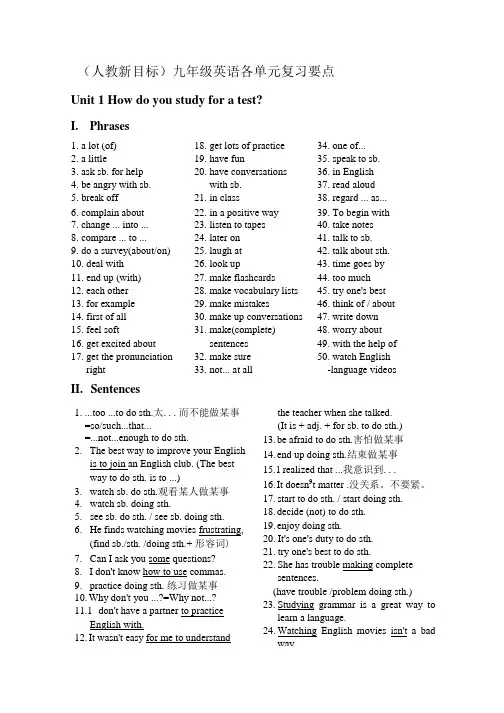
(人教新目标)九年级英语各单元复习要点Unit 1 How do you study for a test?I. Phrases1. a lot (of) 18. get lots of practice 34. one of...2. a little19. have fun35. speak to sb. 3. ask sb. for help 20. have conversations 36. in English 4. be angry with sb. with sb. 37. read aloud 5. break off21. in class38. regard ... as... 6. complain about 22. in a positive way 39. To begin with 7. change ... into ... 23. listen to tapes 40. take notes 8. compare ... to ...24. later on 41. talk to sb.9. do a survey(about/on) 25. laugh at 42. talk about sth. 10. deal with 26. look up43. time goes by 11. end up (with) 27. make flashcards44. too much 12. each other 28. make vocabulary lists 45. try one's best 13. for example 29. make mistakes46. think of / about 14. first of all 30. make up conversations 47. write down 15. feel soft31. make(complete) 48. worry about 16. get excited about sentences 49. with the help of 17. get the pronunciation 32. make sure 50. watch English right33. not... at all-language videosII. Sentences1. ...too ...to do sth.太...而不能做某事 =so/such...that...=...not...enough to do sth.2. The best way to improve your English is to join an English club. (The best way to do sth. is to ...)3. watch sb. do sth.观看某人做某事4. watch sb. doing sth.5. see sb. do sth. / see sb. doing sth.6. He finds watching movies frustrating, (find sb./sth. /doing sth.+ 形容词)7. Can I ask you some questions?8. I don't know how to use commas.9. practice doing sth. 练习做某事 10. Why don't you ...?=Why not...? 11.1 don't have a partner to practice the teacher when she talked.(It is + adj. + for sb. to do sth.) 13. be afraid to do sth.害怕做某事 14. end up doing sth.结束做某事 15.1 realized that ...我意识到...16. It doesn 9t matter .没关系。

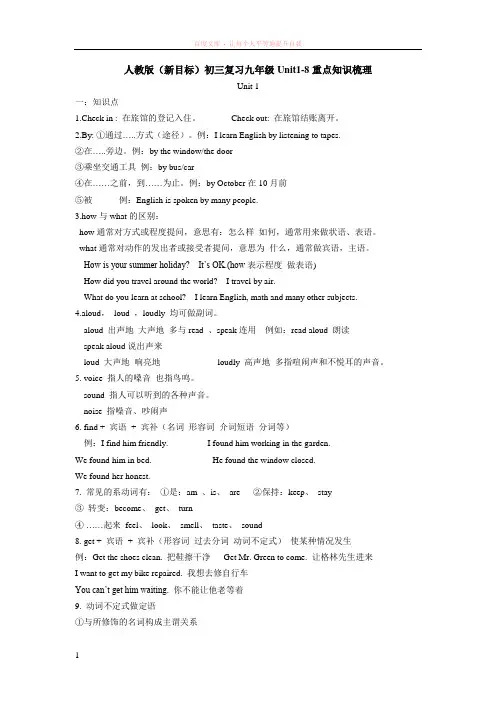
人教版(新目标)初三复习九年级Unit1-8重点知识梳理Unit 1一:知识点1.Check in : 在旅馆的登记入住。
Check out: 在旅馆结账离开。
2.By: ①通过…..方式(途径)。
例:I learn English by listening to tapes.②在…..旁边。
例:by the window/the door③乘坐交通工具例:by bus/car④在……之前,到……为止。
例:by October在10月前⑤被例:English is spoken by many people.3.how与what的区别:how通常对方式或程度提问,意思有:怎么样如何,通常用来做状语、表语。
what通常对动作的发出者或接受者提问,意思为什么,通常做宾语,主语。
How is your summer holiday? It’s OK.(how表示程度做表语)How did you travel around the world? I travel by air.What do you learn at school? I learn English, math and many other subjects.4.aloud,loud ,loudly 均可做副词。
aloud 出声地大声地多与read 、speak连用例如:read aloud 朗读speak aloud说出声来loud 大声地响亮地loudly 高声地多指喧闹声和不悦耳的声音。
5. voice 指人的嗓音也指鸟鸣。
sound 指人可以听到的各种声音。
noise 指噪音、吵闹声6. find + 宾语+ 宾补(名词形容词介词短语分词等)例:I find him friendly. I found him working in the garden.We found him in bed. He found the window closed.We found her honest.7. 常见的系动词有:①是:am 、is、are ②保持:keep、stay③转变:become、get、turn④……起来feel、look、smell、taste、sound8. get + 宾语+ 宾补(形容词过去分词动词不定式)使某种情况发生例:Get the shoes clean. 把鞋擦干净Get Mr. Green to come. 让格林先生进来I want to get my bike repaired. 我想去修自行车You can’t get him waiting. 你不能让他老等着9. 动词不定式做定语①与所修饰的名词构成主谓关系The next train to arrive was from New York. He is always the first to come.②与所修饰的名词构成动宾关系I have nothing to say. I need a pen to write with.I need some paper to write on. I don’t have a room to live in.10. practice , fun 做名词为不可数名词11. add 补充说又说12. join 加入某团体并成为其中一员attend 出席参加会议或讲座join in与take part in指参加到某项活动中去。

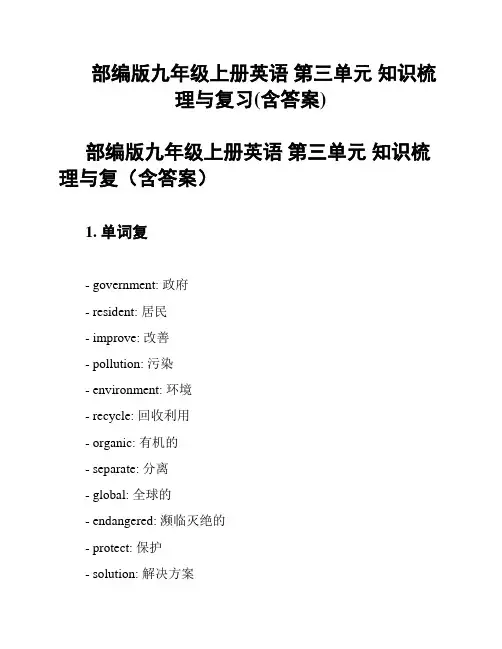
部编版九年级上册英语第三单元知识梳理与复习(含答案)部编版九年级上册英语第三单元知识梳理与复(含答案)1. 单词复- government: 政府- resident: 居民- improve: 改善- pollution: 污染- environment: 环境- recycle: 回收利用- organic: 有机的- separate: 分离- global: 全球的- endangered: 濒临灭绝的- protect: 保护- solution: 解决方案- reduce: 减少- pollution: 污染- campaign: 运动- supervise: 监督- launch: 发起- promote: 促进- educate: 教育2. 语法知识点2.1. 动词不定式动词不定式有"to + 动词原形"的形式,通常用于表示目的、结果、原因、目标等。
常见的动词不定式结构有:- agree to do something: 同意做某事- decide to do something: 决定做某事- hope to do something: 希望做某事- want to do something: 想要做某事- learn to do something: 学会做某事- need to do something: 需要做某事2.2. 介词短语和副词的用法介词短语和副词在句子中用来修饰名词、动词、形容词或其他副词。
常见的介词短语和副词包括:- in front of: 在...前面- next to: 紧挨着- among: 在...之中- between: 在...之间- nearby: 附近- far away: 远离- slowly: 慢慢地- carefully: 小心地- quietly: 安静地- quickly: 快速地3. 知识测试题A. 国家B. 社区C. 居民D. 环境2. Which word means "to make something better"?A. improveB. environmentC. recycleD. organic3. What does the word "endangered" mean?A. 全球的B. 有机的C. 濒临灭绝的D. 解决方案4. Which phrase means "to agree to do something"?A. decide to do somethingB. hope to do somethingC. want to do somethingD. agree to do something5. How do you say "在...前面" in English?A. next toB. far awayC. slowlyD. in front of答案:1. B2. A3. C4. D5. D以上是九年级上册英语第三单元的知识梳理与复,请大家认真复并做好准备。
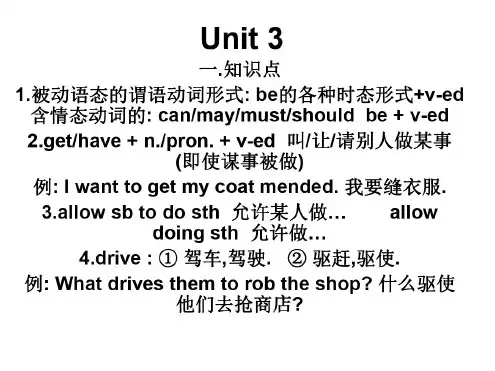
九年级英语上第三单元复习资料16.final 形容词 finall 副词10.affrd 1)供应;给于某事物 affrd sb sth = affrd sth t sbCan u affrd e se water? = Can u affrd se water t e?2) 有足够的(金钱,时间)做……( 常用于否认句或疑问句,常和can, culd, be able t 连用)We can’t affrd t bu a new car.Can u affrd the huse?11. b cheque用支票支付 in cash用现金支付Are u ging t pa fr ur curses b cheque r in cash?12. an ad fr a new car 一那么新车广告13.quite 完全地;相当;( 常修饰形容词、副词和动词)e.g. 1. He is quite tall.2. The b runs quite fast.3. I quite agree with hi.注:quite a big huse = a ver big huse= rather a big huse = a rather big huse 相当大的房子14. an ther 的(常用于否认句或疑问句)D u have an ther questins t as?N. I dn’t have an ther questins t as.注:an ther + 名词单数(常用于肯定句)译为:任何一个其他的……He is taller than an ther b in his class.15.deal --- dealt ---dealt 处理,应付hw…deal with…= what …d with…(处理…… 如何处置……) Hw did u deal with the bad il ?What did u d with the ld shes?。